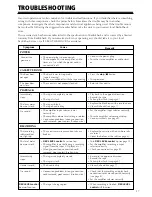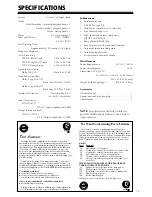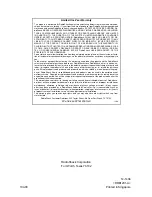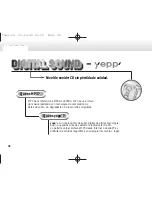
7
CLEANING THE HEADS, PINCH
ROLLERS AND CAPSTANS
The heads, pinch rollers and capstans are
likely to get dirty quite easily. If these parts,
particularly the heads, get dirty, the high
frequency components of a recording will
not be reproduced and the stereo balance
will be impaired, resulting in a
deterioration of the playback sound. It is
therefore recommended that the head
section be cleaned regularly.
1. Set the
POWER
switch to
OFF
.
2. Press the
EJECT
(
0
) button to open the
cassette door.
3. Dip a cleaning swab in cleaning fluid and use
it to wipe the heads, capstans and pinch rollers.
NOTE:
After cleaning the head section, do not
load a tape until the cleaning fluid has dried
completely (about two or three minutes).
MAINTENANCE
Capstan
DEMAGNETIZING THE HEADS
After using the cassette deck for a period of
time, the heads will become magnetized. The
same effect will occur if a magnetized
screwdriver, magnet or other magnetized object
is brought too close to the heads. When the
heads become magnetized, high-frequency
sounds will be lost during recording or
playback, and interference noise may also occur.
The heads should be regularly demagnetized
with a head demagnetizer, which can be
purchased at most audio stores.
When demagnetizing the heads, make sure that
the
POWER
switch of the cassette deck is set to
ON
.
However, be sure to turn down the
amplifier's volume control to its lower
position,
and disconnect any headphones from
their headphones jack. For detailed instructions,
refer to the operating instructions of the head
demagnetizer.
Erase head
Pinch roller
Capstan
Pinch roller
Rec/play head
TIPS ON CASSETTE TAPES
Do not use tapes longer than 90
minutes in length
Because over the C-90 tapes are very thin,
they can easily jam in the pinch rollers and
capstan, and they often are subject to other
problems such as irregular winding.
• Leader tape (which cannot be recorded on) is
provided at the beginning of a cassette tape.
Let the tape run for about 5 seconds before
starting to record, to allow the leader tape to
clear the recording head.
• Do not leave a cassette tape exposed to the
environment. Store the cassette in its case
after use so that dust and dirt do not adhere
to the tape, and so the tape will not get
slack. Store tapes in a location free from
magnetism, dust, dirt, oil, heat and humidity.
• If cassette tapes are irregularly wound, the
tape may get jammed in the rollers. This can
cause damage to both the tape and the deck.
If you are not certain whether the tape is
wound evenly, fast forward or rewind the
tape from beginning to end, to make sure
that the tape is properly wound.
CLEANING THE FRONT PANEL
Clean the deck regularly with a soft cloth. If the
front panel becomes soiled, moisten a soft cloth
with a weak solution of neutral detergent
(diluted in five to six parts water), wring the
cloth well, and wipe the panel clean. Never use
volatile cleaners like thinners, benzine or alcohol
because they will damage the panel finish.






































